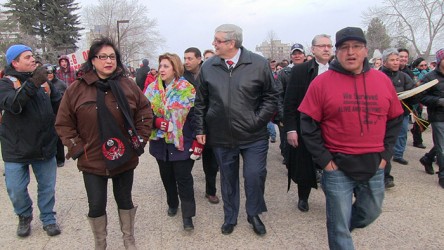Article Origin
Volume
Issue
Year
The Alberta government has pledged to create a new curriculum that will see kindergarten to Grade 12 students learn about the legacy of residential schools, about First Nation treaties, and receive the Aboriginal perspective.
The mayors of Edmonton, Calgary and Wetaskiwin have declared Years of Reconciliation for their cities.
The Truth and Reconciliation Commission will be on agendas when mid-sized cities across Alberta as well as the Northern Alberta Mayors and Reeves caucus next meet. The TRC will also be on the agenda when 22 cities representing two-thirds of the country’s population gather.
Churches beyond the four who signed the Indian Residential School Settlement Agreement have taken responsibility for their actions in remaining silent when Aboriginal children were taken and have asked for forgiveness, pledged to educate their congregations, asked for opportunities to keep listening to residential school survivors, and committed to walking alongside survivors and their descendants.
RCMP Commissioner Bob Paulson asked Aboriginal leaders to encourage their youth to seek employment in the RCMP and pledged to provide professional and culturally-sensitive police services to the Aboriginal population.
Joe Juneau, former NHL player and honourary witness inductee, is one of many who has engaged in “accidental” acts of reconciliation. Juneau spent time connecting with children and forming relationships in northern Quebec through hockey.
Whether newly pledged, intentional or unintentional , the non-Aboriginal community has been supporting Aboriginal peoples and many committed in a more direct way at the Truth and Reconciliation Commission’s final national event in Edmonton March 27-30 to continue that work.
But pledging for the future does not mean action is not needed now.
“The relationship between Indigenous leaders and successive national governments has too often been fractious and disappointing. Moreover in my view, there has been a decline in the genuine interest of Indigenous issues shown by the non-Indigenous Canadians,” said former Prime Minister Joe Clark, who was previously inducted as an honourary witness.
Treaty rights are not being adhered to. Full consultation is not happening at all levels of governmen. Recommendations that have come through various accords and agreements have not been followed through. The federal government is not undertaking a national public inquiry into murdered and missing Aboriginal women and girls.
Cindy Blackstock, executive director of the First Nations Child and Family Caring Society of Canada, and a newly inducted honourary witness, drew attention to a battle that is presently being waged against the federal government. Her organization has been joined by the Assembly of First Nations and others in a case in front of the Canadian Human Rights Tribunal, in which the Canadian government is accused of not caring for children on reserve in the same monetary fashion as children living off-reserve.
“The discrimination by the government of Canada continues,” Blackstock said.
Getting a strong commitment for reconciliation is important, said Justice Frank Iacobucci, who served as the federal government’s negotiator for the Indian Residential School Settlement Agreement, and who was also inducted as an honourary witness.
“Although the report of the TRC will be again crucially important, even more important will be to give meaning and implementation to the words and spirit of their report. And this calls on all Canadians, not just Aboriginals, to support a pathway forward to establish a harmonious, respectful, collaborative partnership between Canada and its Aboriginal people,” he said.
As part of that “pathway forward,” Wab Kinew, director of Indigenous Inclusion at the University of Winnipeg, called for the establishment of a national holiday in remembrance of survivors of Indian residential schools.
“That we spend that day every year hearing their stories again, reminding ourselves of what happened here in these lands, and committing to never letting them happen again,” said Kinew.
- 2929 views

